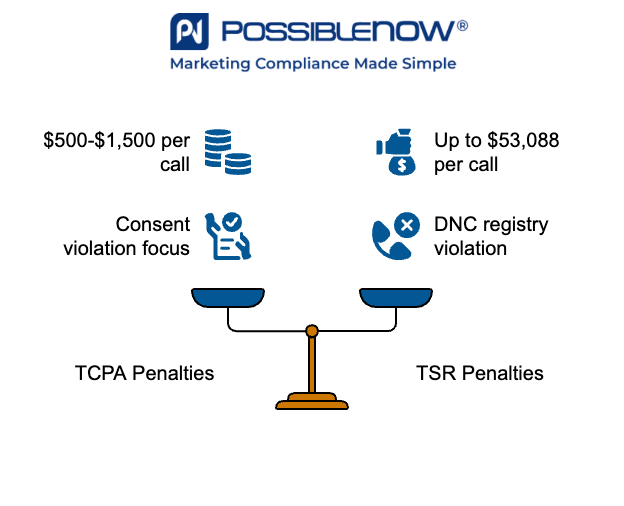Resource Center
What Happens When a Business Ignores Do Not Contact Requests?
Type: Blog
Topic: Zero Party Data

Failing to honor a Do Not Contact (DNC) request can lead to serious legal repercussions for your business. Under laws like the Telephone Consumer Protection Act (TCPA) and the FTC’s Telemarketing Sales Rule (TSR), ignoring opt-outs can lead to regulatory enforcement, costly lawsuits, and reputational harm. Whether the oversight is due to outdated suppression lists, poor data sharing, or a lack of documented consent, the consequences can escalate quickly.
Key consequences of ignoring DNC requests:
- Fines under the TCPA and TSR for each unauthorized contact
- Risk of class-action lawsuits from consumers
- Additional penalties from state-level DNC laws
- Loss of safe harbor protections for internal DNC failures
- Brand damage and increased scrutiny from regulators
In the following sections, you’ll find information on:
Speak With an Expert Today
Federal Legal Consequences Under the TCPA and TSR

The TCPA imposes strict rules around consent for telemarketing calls, especially those involving autodialers or prerecorded messages. Violating these rules by contacting someone who has opted out can result in statutory damages ranging from $500 to $1,500 per call. These penalties apply whether the call was made in-house or through a vendor.
The TSR adds another layer of risk. It governs the National Do Not Call Registry and requires businesses to honor opt-outs from both federal and internal lists. If your organization contacts someone who has registered a DNC request, the FTC can impose civil penalties of up to $53,088 per call. These violations are treated seriously, especially when they appear to reflect systemic issues or repeated failures.
Class-Action Lawsuits and Escalating Financial Exposure
In addition to regulatory fines, businesses that ignore DNC requests face litigation risk from consumers. A single complaint can serve as the basis for a class-action lawsuit, especially if records show that similar violations occurred across multiple calls or campaigns.
Settlements in TCPA-related class actions often reach into the millions. Even when cases are resolved outside of court, legal fees and settlement costs can have a long-term financial impact.
State-Level Laws and Compounding Penalties
Many states have their own telemarketing rules and penalties—and a few maintain state-run DNC lists (e.g., Florida). Others (e.g., New York, California) enforce state telemarketing laws while relying on the National Do Not Call Registry. Contacting someone protected by applicable DNC rules (state-run lists where they exist, or the National Registry) without a valid exemption or permission can trigger additional state penalties on top of federal exposure.For businesses operating across jurisdictions, a fragmented approach to compliance can result in overlapping violations.
Internal DNC Failures and Safe Harbor Gaps
The TCPA and TSR both require businesses to maintain internal DNC lists and honor consumer opt-out requests in a timely manner. Under current law, this must be done as soon as possible and not to exceed 10 business days. Companies that lack a documented, consistent process for managing internal opt-outs may forfeit legal protections, leaving them exposed to liability even if they intended to comply.
This gap is especially dangerous for organizations that rely on vendors or have decentralized systems. If suppression requests are not synced across platforms, contact errors become inevitable.
Reputational Damage and Operational Disruption
Beyond legal risk, ignored DNC requests can erode customer trust and attract unwanted attention from regulators and consumer advocacy groups. Public complaints, negative press, and regulatory investigations can disrupt daily operations and damage your brand’s credibility.
Rebuilding trust is expensive and time-consuming, especially when consumer privacy is involved.
How to Prevent DNC Violations and Protect Your Business
Avoiding these risks starts with a unified compliance strategy. Businesses must connect consent management with DNC suppression, maintain accurate records, and apply consistent rules across all communication channels.
PossibleNOW’s MyPreferences platform helps organizations capture and manage granular, timestamped consent tied to specific contact elements. It allows teams to track opt-ins, opt-outs, and revocations in real time, with full auditability. When paired with DNCSolution®, businesses can automatically scrub contact lists against national, state, and internal DNC registries and identify high-risk numbers before outreach. This Do Not Call solution supports advanced segmentation, suppression logic, and vendor compliance controls.
For companies facing heightened exposure under TCPA regulations, PossibleNOW also offers TCPA compliance services that include risk assessments, corrective action planning, and audit preparation.
Tracking consent and honoring DNC requests are not separate tasks. They must operate as a single, coordinated process. Contact PossibleNOW to learn how to build a defensible, scalable compliance framework.
Request a Demo Today
About PossibleNOW
PossibleNOW is the pioneer and leader in customer consent, preference, and regulatory compliance solutions. We leverage our MyPreferences technology, processes, and services to enable relevant, trusted, and compliant customer interactions. Our platform empowers the collection, centralization, and distribution of customer communication consent and preferences across the
enterprise. DNCSolution addresses Do Not Contact regulations such as TCPA, CAN-SPAM and CASL, allowing companies to adhere to DNC requirements, backed by our 100% compliance guarantee.
PossibleNOW’s strategic consultants take a holistic approach, leveraging years of experience when creating strategic roadmaps, planning technology deployments, and designing customer interfaces. PossibleNOW is purpose-built to help large, complex organizations improve customer experiences and loyalty while mitigating compliance risk.
-
TCPA Regulations and Compliance: Complete Guide
Type: Blog
Topic: Do Not Call Solution
-
Defining Meaningful Metrics: 6 Soft KPIs to Measure Customer Preference Collection
Type: Blog
Topic: Preference Mgmt
-
Email Preference Center Best Practices
Type: Blog
Topic: Preference Mgmt
-
The Basics of DNC Scrubbing: What Is a Do Not Call (DNC) Scrubber and Why Do You Need It?
Type: Blog
Topic: Do Not Call Solution
-
What is Consent Management, How it Works, & Why it’s Important for Data Compliance
Type: Blog
Topic: Consent Mgmt
-
Do Insurance Companies Cover TCPA Damages?
Type: Blog
Topic: Do Not Call Solution
-
8 Best Practices for Capturing GDPR Consent
Type: Webinars
-
Data Silos Cause Communication Gaps
Type: Videos
Topic: Preference Mgmt
-
Difference Between Preferences & Consent
Type: Videos
Topic: Preference Mgmt
-
Integrate Do Not Call Compliance with Preferences
Type: Videos
Topic: Preference Mgmt
-
Customer Preferences Require More Than One Flavor
Type: Videos
Topic: Preference Mgmt
-
Give Customers Opt-Down Options
Type: Videos
Topic: Preference Mgmt
-
Preference Center Organization
Type: Videos
Topic: Preference Mgmt
-
Strategic Consultants Benefited Scotiabank
Type: Videos
Topic: Industry Testimonials
-
Best Practices for Managing Do Not Email Lists
Type: Blog
Topic: Do Not Call Solution
-
How Do Not Call Rules Apply to Nonprofit Organizations
Type: Blog
Topic: Do Not Call Solution
-
How to Train Your Call Center on DNC Rules
Type: Blog
Topic: Do Not Call Solution
